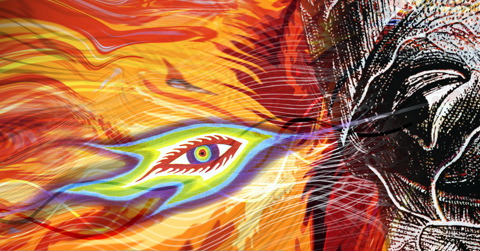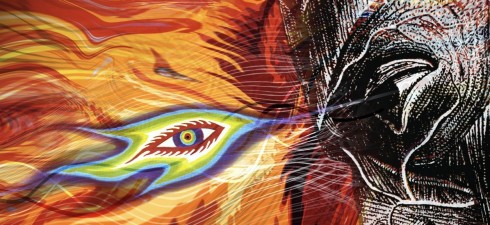 The mind is a stage. Does this sound familiar? Descartes continues: where ideas are illuminated by the inner light of reason. In 1973 a Mormon Apostle, Boyd K. Packer, ventured into the realm of mind with a riff on René:
The mind is a stage. Does this sound familiar? Descartes continues: where ideas are illuminated by the inner light of reason. In 1973 a Mormon Apostle, Boyd K. Packer, ventured into the realm of mind with a riff on René:
The mind is like a stage […] During every waking moment the curtain is up. There is always some act being performed on that stage. It may be a comedy, a tragedy, interesting or dull, good or bad; but always there is some act playing on the stage of your mind.
Descartes saw the mind as a focal point for enlightenment and Packer appears to have adapted the Descartes imagery for use in a more traditionally dualistic view — that of submitting mind to the higher nature of spirit. Certainly both men share a common ideal regardless the differences in worldview.
Welcome to Cipher on a Wall, a weekly column and forum on Doves & Serpents. My name is Matt and I’ll be your host and moderator as we explore the realm of mind, memories, and dreams.
Imagine this as a place to express and discuss anything related to these three topics: mind, memories, and dreams. You’ll detect a Mormon bent as this is coming largely from minds formed within Mormonism, but ultimately we’re discussing core human experiences so we’ll be as big as the topic suggests. You may have noticed in the title of this column an oblique reference to Saturday’s Warrior and the song Paper Dream. I connected with that song as a young man and still do, though in a different way — probably equally sappy and idealistic. Mind, memories (including personal histories), and dreams form a landscape that has possessed and fascinated us since the dawn of consciousness. It’s simultaneously a terrain of extreme human intimacy and awesome, mind-blowing (yes!) exploration.
Mind your step, remember your way, and dream a little dream.

“He felt that his whole life was some kind of dream and he sometimes wondered whose it was and whether they were enjoying it.” – Douglas Adams
I’m intrigued. Looking forward to it!
Brilliant! Love that man. Thank you, Rebecca. See you on Saturday.
My father was a dreamer (died age 93 three years ago). Joel said “old men will have dreams…” My father lived a rich, colorful life, and was by all outward behavior a very orthodox mormon. But he also had very mystical experiences in his youth and had one very vivid revelatory dream that came to pass. Not sure what to make of dreams. Watched “Inception” with my wife a week ago. Not sure what to make of that movie either. Anyway, I am very intrigued as to exactly what constitutes reality, ie, what constitutes the “who” that we are?
I hear you, Ron. Thanks for sharing this bit of intimacy. It’s exactly the kind of thing I hope to explore here. Hope you come back and share more.
I think there must be an underlying ground from which we draw all our experiences but the experiences themselves are an abstraction, an interpretation of that ground. For the time being (see how transient?) I feel like the experience is as real as the underlying ground, in the same way that the words on this page are as real as the thoughts that generated them are as real as the experiences that generated them are as real as the ground which was interpreted — it’s all real, just increasingly abstract, complex, and and interpretive, all of which seem required in the process of generating meaning. As for the who — we may never know. Hope we’re alright with that. :)
That distance of abstraction that you mention, Matt, is really interesting to me. How can we regain a kind of connection? For me that connection happens through being present in – and exploring – the contingent planes of dream, material objects, social interaction, etc. The intersections are where connection takes place – and they are places of exciting synthesis.
I think your column description really speaks to that for me – memory, dream and landscape – these are places I can go to experience the resonance of my ‘reality’.
Matt, thank you for the invitation to share. I do not see how we can ever know “who” we are or really what we are? I read an article (look up later) where it was discussed what if you have your arm replaced then you are still you of course. Then what if your heart is? Then what about half of your brain? What is the essence of you? And consciousness is electrical impulses between matter in brain so what exactly is our substance/essence? And must we have body/material for consciousness thus our death is really a sleep and somehow our memories/who we are “to know and be known” is preserved. I know this is far out but I suspect your section is about far out stuff but I had been reading the Urantia and Paper 112 discussing what is “personality survival.” It seems that the three terrible question to us egocentric souls is: Will I continue to live forever? Will I retain my identity–who I am and relationships of other identities and Will that life be of value or free from hellish pain so I will WANT to continue existing. All other questions of theology are really just not that troubling in comparison IMO….
Ron, I hope you keep coming back and that our conversation is a long one. You’re correct about the inevitability of hitting the “far out.” With mind, memories, and dreams this is always a looming mountain on the landscape. If you remember that article you were reading, please come back and post it. I’m not familiar with the other two items you referenced but am intrigued as well. As for who we are or what we are, I agree that we may never fully know — however, I believe we’ve made some progress through that endless maze. It’s always exciting to learn new things regardless how minuscule or even vanishingly small the learning may be.
If I were to live forever I’d want there to never be an end to meat for curiosity. On the other hand, living forever in an extension of my current state, no matter how unimaginably wonderful, has a touch of hellish foreboding for me. Like standing at the edge of a bottomless chasm with a gun at my back — do I chose immediate extinction? Or to leap at the bottomless chasm?
Sometimes returning to dust has a certain appeal.